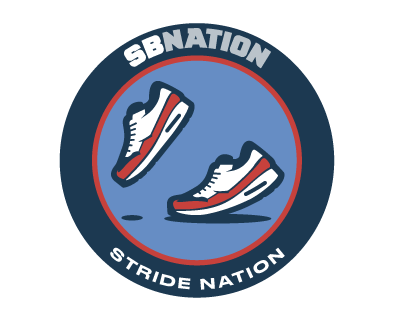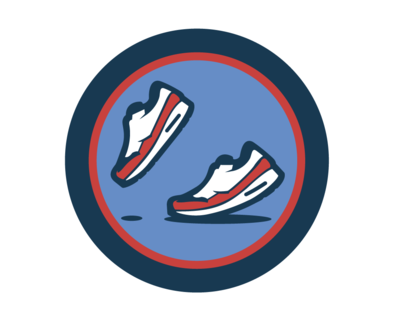- Login
- Sign Up
Denny Mayo | October 16, 2025
Life lessons at Big Sur
How 13 days and one race changed a father-to-be forever
"Oh, you're running the marathon? Good luck."
I thanked the woman behind the rental car desk, only to be interrupted by the rest of her thought: "Can you believe what happened in Boston?"
And so there it was, 20 minutes after landing in California: a reminder of the looming truth that had bounced around my brain the entire flight from D.C. to San Francisco. A reminder that, yes, horrible, scary shit happens - and more to-the-point that, yes, we are all, of course, going to die some day. That much is inevitable. And so after spending the previous 10 days actively avoiding the topic, it was now front and center.
Suddenly, everything about the world seemed off-the-rails.
But for now, I had more immediate concerns - like navigating a rental car agreement. And then navigating a stretch of winding, unfamiliar highway nestled up against a rocky coastline to the hotel where I would be staying before running a marathon along that same coastline. A marathon held just 13 days after bombs went off at the finish of the Boston Marathon around four hours after the start, which happened to be the same time I planned to finish the marathon in Big Sur. Suddenly, everything about the world seemed off-the-rails fucked up.
I managed to avoid being up-sold the insurance.
After leaving the counter and finding our car, my wife, Kate, and I took the Pacific Coast Highway south to Carmel, winding along the seaside cliffs past Half Moon Bay, along the streets of Santa Cruz, and through the lush farmland north of Monterey. We stopped frequently in seaside parking lots to stand on giant rocks and gaze out over the Pacific.
* * *
At 3:45 a.m., I found myself half-awake on the back bench of a school bus that smelled like 60 people covered in Vaseline and nervous sweat. The bus heater underneath the bench two rows ahead did its best to raise the vapor pressure of the Vaseline. The air on the other side of the windows was crisp, clean, and totally unavailable. Runners who had run the race before chattered about the Carmel Highlands and the Bixby Creek Bridge. A man a few rows up talked about the Pikes Peak Marathon. The bus driver came across the PA and thanked us on behalf of her school district two hours away for making the trip to California to share the day with them.
After a while, the mood settled; there's no point in getting excited about waiting outside for a few pre-dawn hours. So we sat, dealt with the smell, and got as comfortable as is possible on thick vinyl benches before arriving at our destination: state park parking lot 26.2 miles south of Carmel.
Of the many things I overheard while waiting for the race to start, the word I heard most (besides perhaps "porta-potty") was "Boston." Blue and yellow Boston Marathon jackets were ubiquitous; blue bibs reading "BOSTON 2 BIG SUR" interspersed throughout the crowd. Those runners served as a reminder that despite all the rational thinking in the world, there was no way for us to know for certain that there wasn't something terrible hiding, waiting for us 26 miles up the road.
(For a few years, a real, tangible link between the Boston Marathon and Big Sur has been in place: a group of crazies who run both races, which are two weeks and 3,000 miles apart. Conventional wisdom states that a month is needed to recover from a marathon before racing again. I would like take this opportunity to inform you that your precious conventional wisdom does not apply to these people.)
As we waited, the world lightened around us, creating silhouettes of the redwoods towering overhead. The race MC called for runners to start filing toward the starting line. We packed in close, turning all three lanes of road into a bobbing patchwork of bright colors, polyester and focus. The morning light trickled in, revealing the tree canopy above, a tunnel in the forest carved out for the Pacific Coast Highway. Dense fog obscured the tops of the old growth.
The moments leading up to the race were encumbered with ritual, as so many beginnings are. The race director's call to attention summoned a quiet that felt anything but: nervous, restless and electric. Then the race director called for a moment of silence for those in Boston, and a new sense of unease settled in. We all made our observances.
And then the starter's pistol cut sharp, and off we went along the coast through the redwoods and hills of Big Sur, north toward Carmel and whatever waited for us at the finish line.
A few miles into the race the sun came out, and the fog did what fog does when confronted with radiant energy: it lifted.
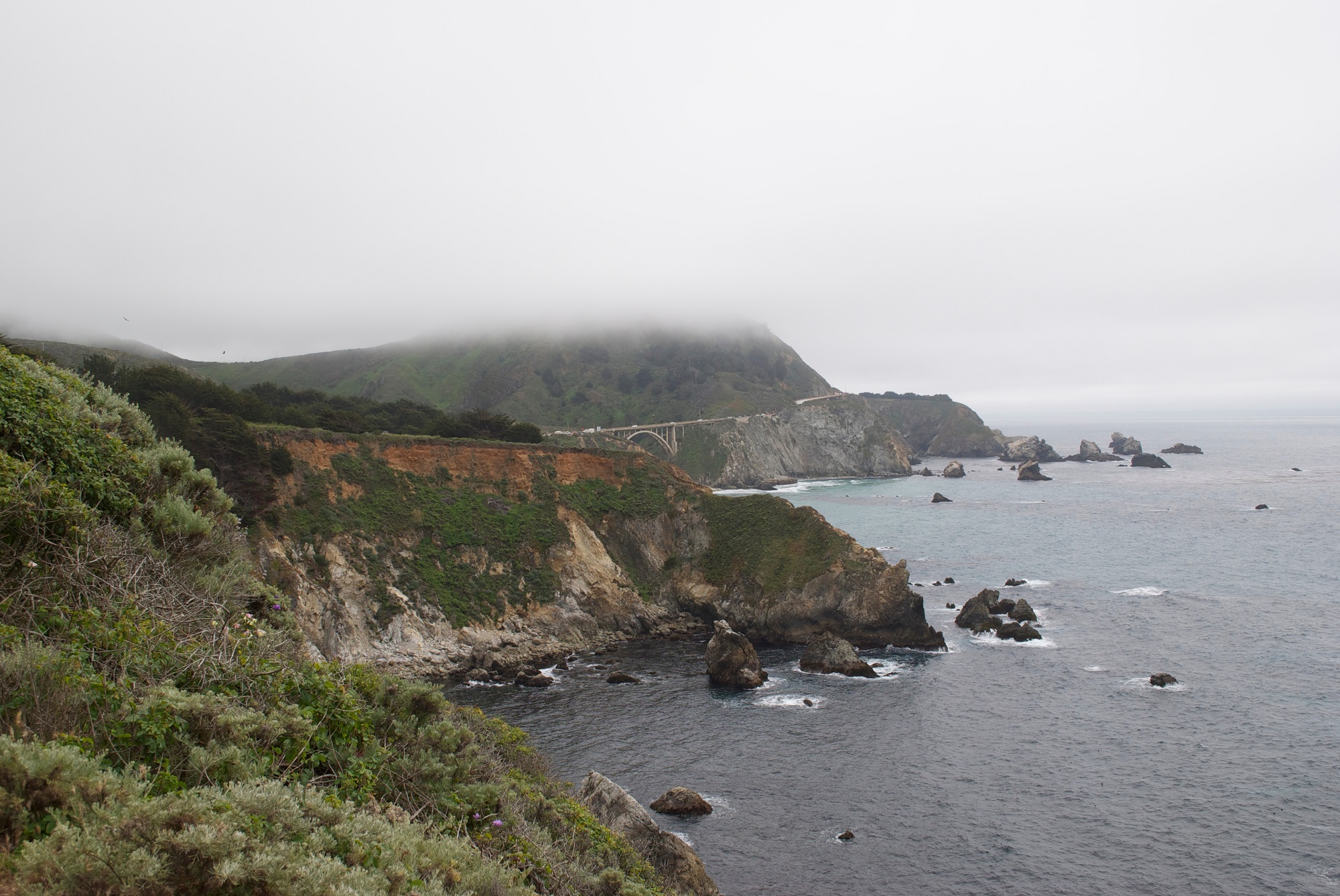 (Photo by Kate Mayo)
(Photo by Kate Mayo)
* * *
A blue and white stick appeared along with a wide smile.
"I have something to show you," Kate said, opening the back door to let me and the dogs in at 6:30 in the morning, much earlier than she usually is awake.
A blue and white stick appeared along with a wide smile. She was pregnant.
I'd like to say that I smiled wide with an immediate recognition of the stick and what it meant; that I draped my arms around her, and said something sincere and meaningful; that I laid my forehead against hers and stood in the kitchen with her for minutes on end.
Instead, I managed to spurt out, "Why ... did you do that now?" with a lack of style and grace that I can only hope for my own sake is not uncommon.
A few hours later, I was at my desk, staring blankly above my computer monitor at the cinderblock wall where I sat a week prior and read about people in Boston who were ripped to pieces. And families slaughtered in Syria. And murders in the city where I live. I found myself sitting at the desk where I, despite my best efforts, am inundated with horrible and terrifying news every time I open a Web browser, where I'm reminded daily that I happen to exist in a world that often appears to be careening closer and closer to the edge. What's over the edge, exactly, I don't know. But it's most certainly there, best I can tell.
So I stared at the wall and wondered what kind of selfish prick would try to raise a child in a world that can be so stark and hopeless - a place collapsing in on itself with discord and self-destruction.
And then I snapped out of it. I remembered that I'm just a guy in a first-world country, sitting at a desk full of technology, and that the Visigoths aren't coming over the nearest hill any time soon, and that maybe it's time to set a new home page on my Web browser.
* * *
(Photo by Edie Ellis)
Nearly eight miles into the Big Sur Marathon is a downhill stretch of road that approaches a ravine. The approach is long and straight, providing a view of the cove below - and the climb that awaits. Green cliffs capped with an obscuring white fog rise up on the horizon, above a mix of crystal-blue water, tan sand and black-rock islands. The approach to the climb is lengthened by a drop into a creek canyon. There, at the base of the hill, Japanese drums beat with a rhythm that resonates deep in your chest. I leached whatever momentum from them that I could before I passed them by. Then up the hill we went.
We climbed 600 feet over the course of two miles up into the fog and wind, passing around bends along the cliff line. Soon (relatively soon, at least) we were no longer climbing, and the earth turned over and downward.
At the top of the hill we were offered a respite: a water stop, complete with energy gels. A 9-year-old local said, "Cool shoes, bro," and I replied, "Thanks, bro." And then he gave me a cup of water and a nod. His compliment was sincere, and so was my thanking him.
Nearly two miles after the hill's peak at Hurricane Point, we rounded a bend that revealed a bridge. This bridge seemed familiar, as though I'd seen this bridge somewhere before - maybe in a dentist's golf magazine, or a Cadillac commercial. Now, though, I didn't hear muzac or pop music, but something else: the faint trickle of a grand piano in the distance.
On the other side of the Bixby Creek Bridge, beyond the halfway marker for the race, was a gentleman in morning dress playing a Steinway. There may not be a more beautiful place in the world to run than right there, across that bridge while slow jazz piano sustains on the horizon. I realized this, and I smiled like a fool.
* * *
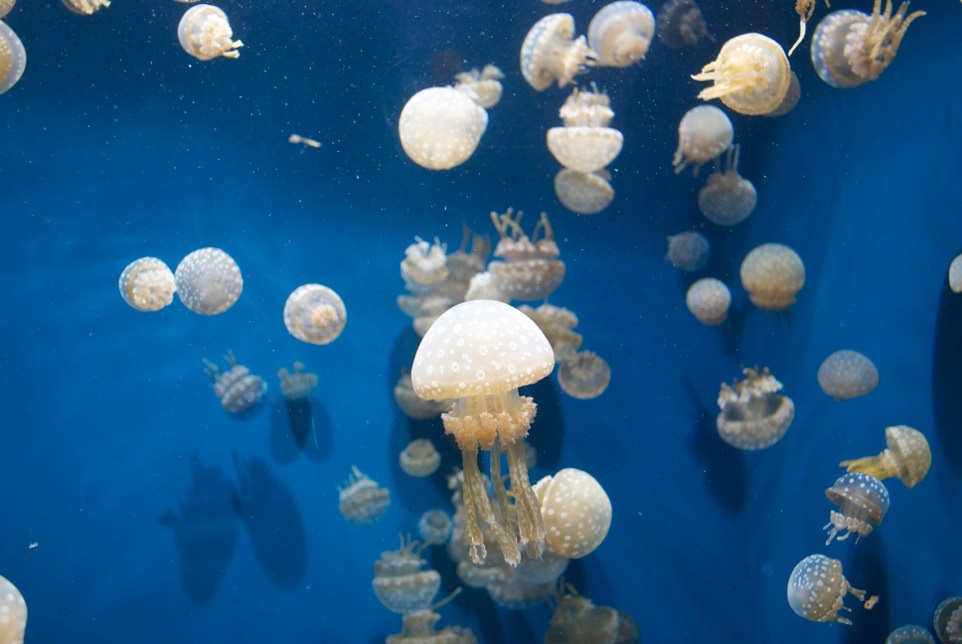 (Photo by Kate Mayo)
(Photo by Kate Mayo)
The day before the race, Kate and I spent a few hours in Monterey wandering the boardwalk and visiting the aquarium, watching jellyfish and seahorses dance underwater. We perused an antique shop along Cannery Row that was filled with diving helmets and glass floats and an opium bed. We ate lunch atop the breakers and watched gulls dive for fish.
Then we headed south to scout the course, from Monterey along the PCH toward Big Sur. The beaches were less frequent here than north of Santa Cruz, allowing for fewer turn-offs and picture-taking opportunities. We stopped a quarter mile north of the Rocky Creek Bridge and marched through the brush in order to sit on a cliff and see the bridge's whole arch in the distance. For a few minutes, I wondered about engineering.
We ate dinner at a restaurant in Big Sur that sits atop a cliff overlooking a pasture and the ocean. Our waiter told us that when the time is right, you could see blue whales migrating or humpbacks breaching. We had our dinner - a steak and potatoes for me, a roasted chicken for Kate - and slowly made our way back to the car to make the trip back to Carmel. Along the way north, we got a picture of the ascent up to Hurricane Point.
Throughout the day, one of us would randomly think baby thoughts and smile.
* * *
After leaving the redwoods and crossing the bridges, the marathon course is serene, passing through hills that roll as though someone had tossed a lush green blanket on top of some boxes and forgot to pick it up.
Occasionally I'd remind myself to have a look around and really take it in - all of it.
Further north, the course begins to cut through hills, carving small canyons into the countryside. These trenches are perhaps 30 or 40 feet at their highest, the walls made of tan soil. Over the course of 80 years nature has taken its toll, washing the dirt away and forming spires and troughs of the disintegrated land that look less like a retaining wall and more like a church organ.
Every few miles I'd stop and walk. My lack of solid training did me no favors and my mind grew weary. Occasionally I'd remind myself to have a look around and really take it in - all of it. With about three miles to go, there was a table with strawberries from a local farm. I ate one, and that strawberry will probably be the best-tasting strawberry that I ever eat.
I knew, of course, that the memories of this run and that place will soon enough fade. As I try to remember that place after the fact, the rocks are a little smoother, the flowers duller, and the fog not quite as majestic, as though I'm seeing my run on an old 8mm tape: grainy and faded.
But at the time: it was stunning. So I fought back the little bit of sadness that accompanied the knowledge that one day the memories of this will be gone. I told myself to remember this, and share it. To bring my child here, so that I can show them the wondrous things that the world can offer. To tell them that this place made me happy and curious. In that moment, I wanted nothing more than to some day bring them there - to that place where I ran after learning about my impending fatherhood - and run the race with them.
I thought: remember this, and share it with your child.
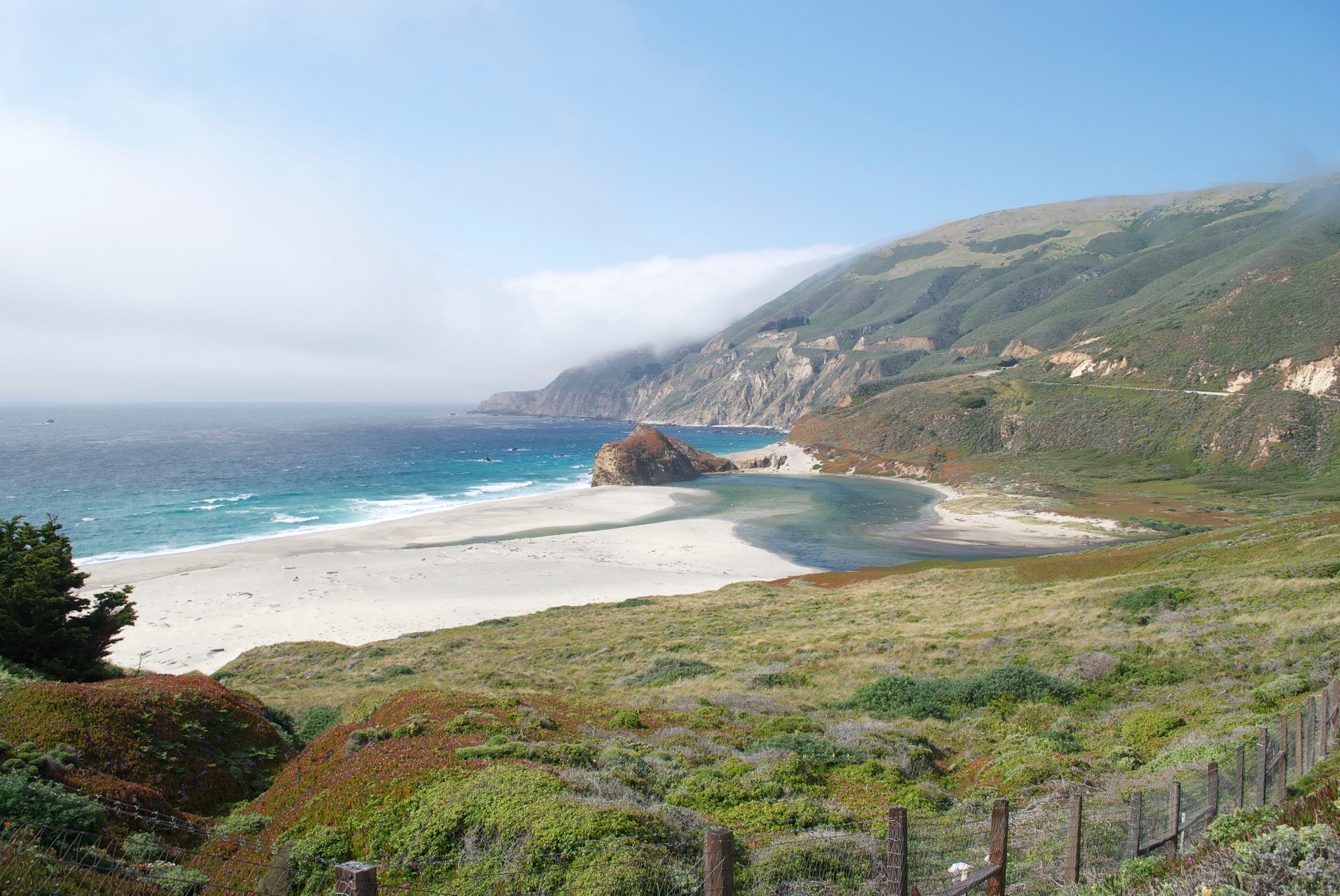 (Photo by Kate Mayo)
(Photo by Kate Mayo)* * *
Life is, in a very reduced form, a series of firsts and lasts. At some stage - a stage that we all acknowledge will happen, but hope is a long way off - we reach an inflection point and the lasts become more frequent that the firsts. And so there I was, in a marvelous place, on my first long run after finding out that soon enough our family of two would be growing.
Long runs are where I go to do my thinking. In Big Sur, I spent the three hours I was awake before the race and then the four hours on the course working through an amalgamation of emotions, allowing the gravity and excitement and fear of bringing a child into the world wash over me. Those thoughts are gone now, lost somewhere in between synapses and never captured on film.
Along the course volunteers jokingly said that each hill they were camped on was the last on the course. (Note to marathon spectators: this is not a funny joke.) With a mile to go in the race I came to a slight hill, perhaps a quarter mile in length, and it was clear that this was indeed The Final Hill. Walking had become an increasingly attractive option at this point; my ankles, thighs, and back were all non-responsive, and my arms hung like dead weight.
I looked to my left, out over Carmel Bay, and decided to walk up the hill. A woman on the side of the road said to me "You can finish! Finish strong!" or some such thing. (I had a similar experience in New York City in 2009, where I ran poorly and was very aware that I was running poorly and hearing those words made me want to curl up in a ball and cry - of course I was going to finish.)
For the first time in my life, I stopped running a race and walked just to be there a little longer.
I couldn't help but feel a tinge of pity for this woman who could not understand: I wanted to walk that hill because I wanted to spend a few more minutes there, looking out over blue water at the cypress trees in the distance.
For the first time in my life, I stopped running a race and walked just to be there a little longer.
Maybe I wanted to stay there on the course to keep the world and its ugliness at bay for a few minutes. I like to think it was to be there and enjoy the world - all of it - for as long as I could. Soon though, the hill was behind me and I was running again, making my way to the finish. I crossed the line with tears in my eyes, then walked on through the finish area to find my wife. We hugged and cried together, neither really knowing why but both knowing that something wonderful had happened.
* * *
About 12 miles into the race I met a man named Larry. He introduced himself to me not to discuss himself, but to discuss another runner a few feet in front of us. Larry had "only" run the marathon in Big Sur 21 times; the man ahead had run all 28. All runners are beholden to some impossible standard, even those who have run the same marathon 21 times.
"Twenty-eight years?" I said. "That's crazy as hell, man. I'm 29. He's been out here ever since I could walk."
"I've got a son who's 29," Larry told me, "and he's too pussy-whipped to come out and run with me." After saying this, Larry burst into the kind of uneven laughter that comes after an hour and a half of running. "I'm sorry," Larry said, "I can't believe I actually said that out loud. She's a real looker though!"
As we moved along, Larry told me about his life: that he grew up in semi-rural Ohio, graduated from Ohio State, and moved away to chase the dream of an acting career. In addition to many Big Sur Marathons, Larry had run one ultramarathon (the JFK 50 Miler) in western Maryland.
Larry's life sounded a lot like it was coming from a version of myself 40 years in the future; I grew up in suburban Ohio, graduated from Ohio State, and moved away for graduate school. Six months before running Big Sur, a friend and I finished the JFK 50 Miler together (both too proud to back off a promise made to each other after a few hours of heavy drinking).
Larry cast a sense of familiarity that put me at ease, and led me to talk to him longer than all other conversations I've had with strangers during my four previous marathons.
We talked about leaving Ohio, and if either of us ever thought about returning. We talked about work, and Larry told me about his company (oil spill cleanup in the Gulf). When I asked him about the details of the science involved (something to do with catalytic oxidation of alkanes), Larry self-effacingly told me he's just the money involved. Larry's competitive streak came out from time to time; any time I talked about my goals for the race or past race times, he didn't hesitate to point out that he was both "keeping up with [my] ass" and more than twice my age.
either of us could throw a ball in any direction and hit something beautiful.
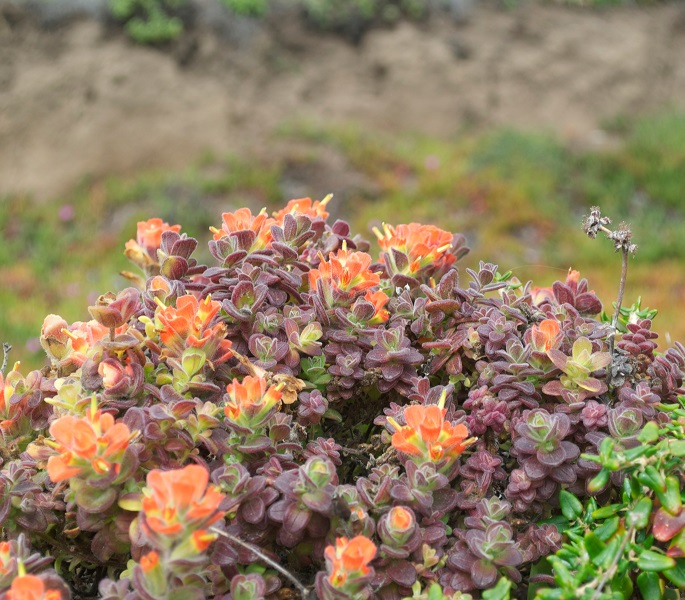 (Photo by Denny Mayo)
(Photo by Denny Mayo)
We talked briefly about the bombing in Boston. "You know, I'm really tired of all of this shit, you know?" Larry said. "Every day, there's more shit. The world is just full of shit, man. And I'm sick of it."
Perhaps because of my age, or naivety, or the fact that I hadn't run the course before, I pointed out that we were surrounded by cliffs and mountains and rock formations and flowers and fog. That either of us could throw a ball in any direction and hit something beautiful. That even though the world keeps throwing shit at us, we were running along the California coast that morning, and that there was some hope in that. Larry conceded that maybe I had a point, but not without pointing out all of the shit one more time.
More than any other topic during our time together, Larry kept circling back to his son. And maybe it was because I was a little tired, or a bit disarmed by Larry's cynical charm, or because I was in awe of the coast, but after Larry said something about how difficult children can be when they're grown, I said to Larry the words that I'd wanted to say for the past five days: "My wife is pregnant."
Larry congratulated me, and then asked if it was a boy or a girl. "I have no idea, man. She just pissed on a stick a few days ago. You're the first person that I've actually talked to about it."
"Well, I hope it goes well. Sons are great, until they won't run a goddamned marathon with you because they don't want to run slower than their old man."
* * *
I spent a lot of time that Sunday in Big Sur thinking that I will be able to choose which idiosyncrasies our child (which we now know is a girl) will get from each parent, and that I will be able to choose what kind of father I will be; that she will get her mother's love of art and dance, and laughter, paired with my curiosity and patience; and that I will be kind and consistent, and will teach her not only how to not fall, but how to fall with grace and pick herself back up and try it again.
But I can't possibly know these things until she is here, and I will learn them right along with her. Maybe one day I will run along the California coast with her and take her to the place where I spent one of the most rewarding days of my life. But maybe I won't - that will be up to her.
-----
Title photo by Maria Prince.
* * *
